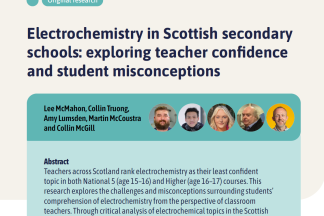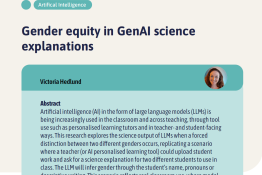Electrochemistry in Scottish secondary schools: exploring teacher confidence and student misconceptions
Issue 395 | Page 53 | Published Nov 2025
Description
Abstract
Teachers across Scotland rank electrochemistry as their least confident topic in both National 5 (age 15–16) and Higher (age 16–17) courses. This research explores the challenges and misconceptions surrounding students’ comprehension of electrochemistry from the perspective of classroom teachers. Through critical analysis of electrochemical topics in the Scottish Curriculum for Excellence, in combination with examination statistics and survey data, rational conclusions can be derived on the roots of these challenges and how they can be addressed.
Useful Links
Survey questions: https://docs.google.com/document/d/14xm2mEhaBHrohoY8w3zyXcrTPEAB6eHt9Av2jyiktsQ/edit?tab=t.0
References
Education Scotland (2024) Curriculum for Excellence.
https://education.gov.scot/curriculum-for-excellence
Fahmina, S., Indriyanti, N., Setyowati, W. A. E., Masykuri, M. and Yamtinah, S. (2019) Dimension of chemical literacy and its influence in chemistry learning. Journal of Physics: Conference Series, 1233(1), 012026.
Karpudewan, M. and Daman Huri, N. H (2023) Interdisciplinary electrochemistry STEM-lab activities replacing the single disciplinary electrochemistry curriculum for secondary schools. Journal of Chemical Education, 100(2), 998–1010.
Lin, C.-Y. and Wu, H.-K. (2021) Effects of different ways of using visualizations on high school students’ electrochemistry conceptual understanding and motivation towards chemistry learning. Chemistry Education Research and Practice, 22, 786–801.
Meyer, T. H., Choi, I., Tian, C. and Ackermann, L (2020) Powering the future: how can electrochemistry make a difference in organic synthesis?’ Chem, 6(10), 2484–2496.
Scottish Qualifications Authority (2019) Higher Chemistry, September 2019, Version 3.0.
https://www.sqa.org.uk/sqa/47913.html
Scottish Qualifications Authority (2023) National 5 Chemistry Question Paper 2023.
www.sqa.org.uk/pastpapers/papers/papers/2023/N5_Chemistry_all_2023.pdf
Scottish Qualifications Authority (2023) Higher Chemistry Question Paper 2023.
www.sqa.org.uk/pastpapers/papers/papers/2023/H_Chemistry_all_2023.pdf
Taber, K. S. (2009) Challenging misconceptions in the chemistry classroom: resources to support teachers. Educació química, 4, 13–20.
Turner, K. L., He, S., Marchegiani, B., Read, S., Blackburn, J., Miah, N. and Leketas, M. (2024) Around the world in electrochemistry: a review of the electrochemistry curriculum in high schools. Journal of Solid State Electrochemistry, 28(3), 1361–1374.
Zhang, X., Guo, S.-X., Gandionco, K. A., Bond, A. M. and Zhang, J. (2020) Electrocatalytic carbon dioxide reduction: from fundamental principles to catalyst design. Materials Today Advances, 7, 100074.
More from this issue
Abstract
Practical work can play a very important role in the teaching and learning process in school science in...
Abstract
Artificial intelligence (AI) in the form of large language models (LLMs) is being increasingly used in the...
Henry Ward shares a linguistic–rhetorical approach to building higher-order literacy skills in science.
Resource production...




